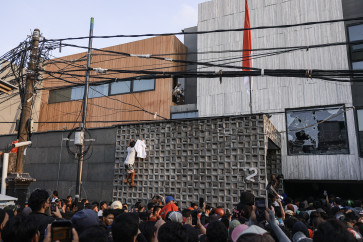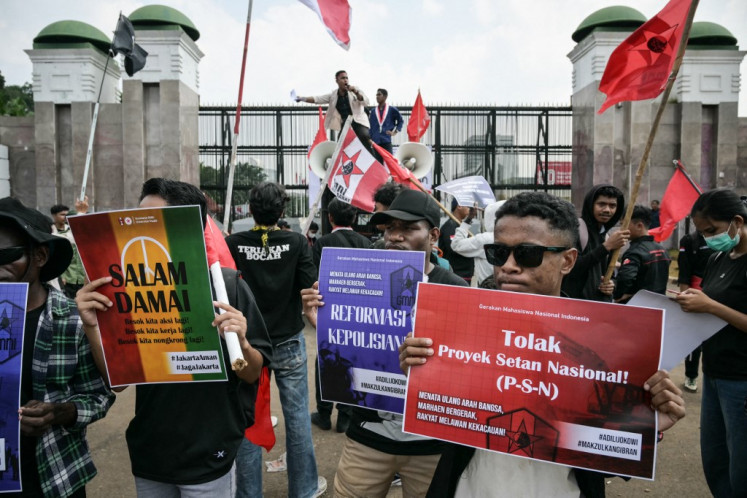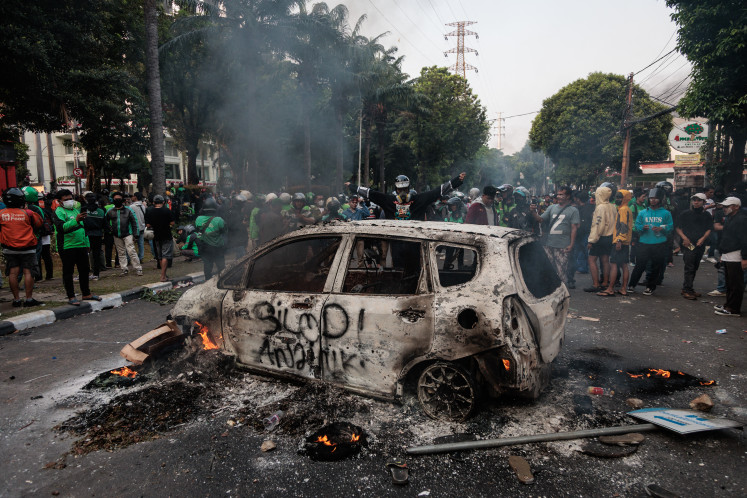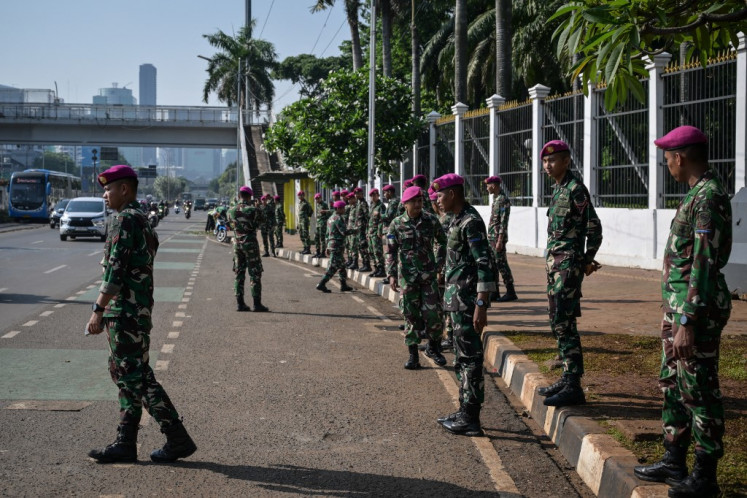Popular Reads
Top Results
Can't find what you're looking for?
View all search resultsPopular Reads
Top Results
Can't find what you're looking for?
View all search resultsA bleak fate for Bhinneka Tunggal Ika?
First they came for the communists, and I didn’t speak out because I wasn’t a communist
Change text size
Gift Premium Articles
to Anyone
F
irst they came for the communists, and I didn’t speak out because I wasn’t a communist. Then they came for the trade unionists, and I didn’t speak out because I wasn’t a trade unionist. Then they came for the Jews, and I didn’t speak out because I wasn’t a Jew. Then they came for me, and there was no one left to speak out for me — German Pastor Martin Niemoller in 1946.
More than unconstitutional, the ban on Ahmadiyah’s religious activities in East Java goes against everything this republic stands for.
Unless President Susilo Bambang Yudhoyono intervenes and reverses the ruling, this could mark the beginning of the end for Bhinneka Tunggal Ika (Unity in Diversity), the motto that has guided this nation since its founding in 1945.
Religious diversity is coming under threat.
East Java is the biggest prize for the collective movement of several conservative Islamic organizations in Indonesia — including the largest of them all, Nahdlatul Ulama (NU) — as they campaign to have Ahmadiyah outlawed.
The movement earlier succeeded in securing a similar ban in the East Kalimantan town of Samarinda and has been pressuring the West Nusa Tenggara provincial government to institute a similar ban.
East Java Governor Soekarwo on Monday issued a four-point decree that ordered Ahmadiyah to cease all proselytization, banned the use of its name in public places, demanded all signboards bearing the Ahmadiyah name on mosques and schools be dismantled and banned the use of its name on any forms of identification.
Falling short of outlawing Ahmadiyah entirely, Soekarwo said the decree was issued in the name of public security and order, something which he claimed as governor he was empowered to do.
It is easy to see where all this is going. What they cannot achieve nationally, they do first locally. One is immediately reminded of Mao Zedong’s guerrilla warfare tactic of launching a campaign in an area and having it spread until it surrounded the city. This is happening in Indonesia faster than many thought. On Tuesday, the Islam Defenders Front (FPI) launched a massive demonstration in Jakarta demanding that the city administration follow suit in banning Ahmadiyah.
The Indonesian Ulema Council, supposedly the umbrella organization for all Islamic organizations in the country, has led the campaign to have Ahmadiyah completely outlawed in Indonesia.
While Ahmadiyah believes in most of the tenets and principles of Islam, it recognizes its founder Mirza Ghulam Ahmad as a prophet, in contravention to the belief of mainstream Sunni Muslims that Muhammad was the last prophet.
The campaign had been waged in the streets by the FPI, which has coordinated or supported some of the violent attacks on Ahmadiyah followers and their property in recent years. There are more than 200,000 members of Ahmadiyah throughout Indonesia, and as they tend to live in housing complexes they became easy prey.
Last month, three Ahmadis were killed in a mob attack at one of their homes in Cikeusik, Banten. The incident, and another mob attack on churches two days later in the Central Java town of Temanggung, prompted President Yudhoyono to order his government and the police to ban organizations that use violence and spread hate.
But, his demands only emboldened the FPI even more as they then threatened to bring down the government.
NU, Indonesia’s largest Islamic organization, threw its weight on Monday behind the campaign to have Ahmadiyah outlawed. Making the call in a speech in Sampang, East Java, NU chair Said Aqil Siradj described Ahmadiyah as “clearly deviant” and said the group should therefore be banned.
The central government has so far resisted the mounting pressures to issue an outright ban on Ahmadiyah. It issued a vaguely worded decree in 2008 ordering Ahmadiyah to stop all activities deemed counter to Islam, which is the dominant religion in the country.
The FPI saw this as not far-reaching enough and has continued with its violent campaigns.
The Ahmadiyah case has put Yudhoyono in a difficult predicament. As President, his oath of office obliges him to uphold the constitution, which includes guarantees of freedom of religion and protection for people of all faiths. But, he cannot ignore public opinion either.
While the government, or the courts for that matter, cannot make judgments about the substance of a religion, it can rule to ban an organization on the grounds of public order and security.
Other suggestions floated to break the impasse include ordering Ahmadiyah to stop all claims to being part of Islam or to term it a new religion apart from Islam. But, calls to ban or outlaw the group appear to be growing stronger and anything less is not likely to stop the ongoing campaign.
An outright ban on Ahmadiyah raises the larger question about the state of freedom of religion in Indonesia, and more particularly the government’s ability to guarantee that freedom and to protect the rights
of religious minorities to practice their faith.
Christians and Catholics, the largest religious minorities in the country, have also seen their churches being targeted by violent FPI campaigns in recent years.
If Ahmadiyah is banned, no religious minority is safe in Indonesia.
Sukarno, Mohammad Hatta and the rest of the nation’s founding fathers must be turning in their graves seeing the republic they fought to create with their blood, sweat and tears — that was open to all religions — now being torn apart by religious difference.
The writer is a fellow at the East-West Center in Washington and senior editor of The Jakarta Post.










